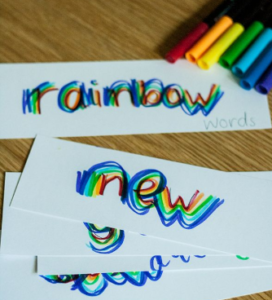11 October 2019
Spellings this week are from the ‘Common Exception’ word lists. Common exception words are words in which the English spelling code works in an unusual or uncommon way.
Year 1
- are
- ask
- come
- friend
- full
Year 2
- today
- says
- was
- has
- there
- love
- one
- put
- pull
- house
04 October 2019
Use last week’s spellings and write them in rainbow writing.

Year 1
- you
- be
- she
- go
- by
Year 2
- are
- ask
- come
- friend
- full
- here
- there
- where
- were
- pull
Friday 27 October 2019
Spelling
This week, will be focussing on the use of apostrophes for contraction. This occurs when we combine two words to be one – usually to change the formality of our writing/language.
I am = more formal
I’m = less formal
As this is revision of a previously taught rule, we’d like children to be confident using all of the below words. This may seem a lot but most of this has been taught since much lower down school. We want children to focus more on the ones they find trickiest. Evidence any revision in homework books. A selection of these words will be tested on Friday 04 October 2019.
| I will/I’ll
I am/I’m do not/don’t I would/I’d had not/hadn’t you are/you’re you will/you/ll |
he will/he’ll
she will/she’ll is not/isn’t cannot/can’t have not/haven’t they are/they’re |
you have/you’ve
has not/hasn’t will not/won’t I had/I’d are not/aren’t could not/couldn’t |
Friday 27 September 2019
Spelling
Practise the following words:
| bicycle
decide describe exercise guide height surprise |
cried
slide polite applied replied why |
|
You can do this by:
- trace, copy, replicate
- doodle words
- look, cover, write, check Challenge: Use these words in a sentence.
27 September 2019
This week’s spellings for both years 1 and 2 come from the ‘Common Exception‘ word lists. These words are words in which the English spelling code works in an unusual or uncommon way. They may be exceptions to spelling rules, or words which use a particular combination of letters to represent sound patterns in a rare or unique way.
Year 1
- you
- be
- she
- go
- by
Year 2
- are
- ask
- come
- friend
- full
- here
- there
- where
- were
- pull
Friday 20 September 2019
Spelling Challenge:
We have been looking at the long ‘e’ sound in spelling lessons this week.
Make a nonsense story from the words below. Take care to spell the words correctly.
| Spelling list
believe breathe complete appear extreme increase |
relief money chimney people busy quickly |
|
Friday 20 September 2019
Our spellings this week focus on an important spelling rule: drop the y for an i. This is a common spelling rule in the English language. In many root words ending in y, we change the y for an I when we change the word. For example, happy can be happier or happiest. This week, children should find words ending in y and explore how they can change the word – are there any exceptions to the rule? Here are a few words to get you started:
cry try worry copy funny
20 September 2019
Use last week’s spellings and put each word in a sentence.
Year 1
• the
• to
• said
• were
• his
Year 2
• the
• to
• said
• were
• his
• you
• be
• she
• go
• by
Friday 13 September 2019
Our spellings this week focus on an important spelling rule: double up for a short vowel sound. In our writing, lots of us are still not ‘doubling up’ for short vowel sounds. For example, when writing the word ‘hopping’, many of us might spell it ‘hoping’ which is incorrect. In this example, the ‘o’ makes a short vowel sound and so the next consonant ‘p’ needs to be doubled up. This is an especially significant error as it completely changes the meaning of the word. Children will be tested on these words on Friday 20 September 2019.
accommodate
accompany
correspond
immediately
opportunity
exaggerate
occupy
appreciate
13 September 2019
This week’s spellings are from the ‘Common Exception Words’ lists. They are words that don’t follow the usual spelling patterns and are sometimes called ‘tricky words’ – children just need to be able to read them on sight and learn how to spell the words.
Year 1
- the
- to
- said
- were
- his
Year 2
- the
- to
- said
- were
- his
- you
- be
- she
- go
- by